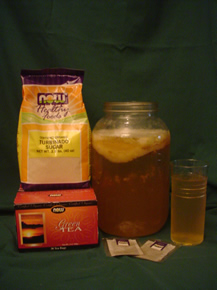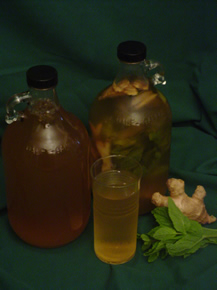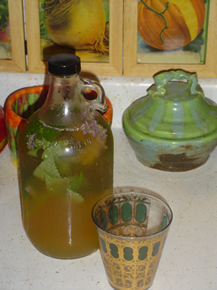Kombucha
Kombucha
Kombucha is a health promoting beverage and natural folk remedy made through fermentation. Although often referred to as a mushroom, the kombucha culture—which resembles a thick, pale pancake—is actually a symbiotic relationship of beneficial yeast, bacteria, other microorganisms, and cellulose. When combined with a black or green tea solution, the culture produces a delicious beverage of health promoting acids and nutrients.
Kombucha consists of many B vitamins, probiotics, amino acids, enzymes, and a host of other vitamins and minerals. The taste is reminiscent of an effervescent cider.
Like other lacto-fermented “live” foods—such as yogurt, kefir, sauerkraut, kim chi or miso—the bacteria present in kombucha detoxify the liver, improve metabolic function, and are extremely nutritious.
Kombucha became popular in the U.S. during the 1970s, due in large part to research done on the beverage in the Soviet Union two decades before. After WWII, the Soviet Union observed a significant increase in cancer throughout the country. In 1951, Russian scientists began mapping out concentrations of cancer in various regions to determine the cause. They found that certain communities had hardly any cancer, even though they were located near toxic industrial facilities. Even more surprising, many of the residents from these communities exhibited comparatively higher levels of cigarette and alcohol consumption. The researchers found that people in these areas drank kombucha everyday, and concluded that consumption of this beverage helped them detox from environmental poisons, preventing the cancers seen in surrounding areas.
Read more about the Soviet kombucha research here.
We offer Kombucha “mushrooms” and informative handouts to encourage your homebrew, but if time is limited we sell kombucha in half gallons for $17 plus a $3 deposit for the glass jug.




Kombucha: An Ancient Beverage for Modern Times
from Association for Asian Research 5/12/2007 By Conan Milner
“Right now what really gets the most attention in the beverage industry is the energy drinks,” laments G.T. Dave, founder of a beverage company. “They’re loaded with stimulants, which can give you heart palpitations and jitters, and they affect your sleep patterns.”
In this fast-paced world, we all crave a little pick-me-up. But perhaps an ancient beverage could offer a healthy alternative to our modern woes.
Dave makes kombucha: a fermented ancient Chinese drink with a history of thousands of years.
“I like to think of my product as the anti-energy drink,” explains Dave. “That’s not to say that it doesn’t give you energy-it certainly does-but it’s a good, clean form of non-stimulant energy that puts you back in touch with your body.”
Many health enthusiasts have long championed fermented foods like sauerkraut, kefir, yogurt, and kombucha because of their enzyme-rich profile. Sadly, traditional fermentation has fallen out of favor with modern production, and overall health has been the worse for it.
It might be hard to imagine that such a healthful beverage could generate from what looks like a shiny pancake, but the kombucha culture, often referred to as a mushroom, is actually a symbiotic colony of beneficial yeast and bacteria. The resulting tea is made by combining this culture with a mixture of tea (black, green, or oolong) and sugar, and fermenting these ingredients for a week or two.
A healthy beverage made with sugar? While the sweet stuff is required to make the ferment, very little remains in the finished drink. During the brewing cycle, the culture consumes your ingredients, leaving behind life-giving nutrients, including a full range of B-vitamins, enzymes, probiotics, and special acids found to quickly move toxins out of the body.
“According to traditional Chinese medicine, kombucha tea was referred to as the Tea of Immortality and the elixir of life,” writes Ed Kasper, a California licensed acupuncturist, medicinal herbalist, and a master kombucha brewer. Kasper has been selling the beverage, as well as kombucha cultures and brewing kits, online since 1997. “I started giving it to my patients and clients and found that it addressed some of their health concerns.”
“It helps control my hunger at night,” says Jennifer Zielinski, a mother of three from Chicago, who has been making kombucha for the past year and a half. “If I drink a big glass of kombucha in the evening, it keeps me from raiding the fridge.”
People report many different health benefits from drinking kombucha, including better digestion, clearer skin, and reduction in joint and body pain.
G.T. Dave’ s mom’s regular kombucha consumption maybe even helped with her cancer. After she started doing better “she started to research kombucha to find out what made it so healthy,” explains Dave. “She came across several articles and reports that talked about kombucha and its positive impact on suppressing cancer and any other kind of metabolic disease.”
“It’s not a miracle; it’s just not understood,” says Kasper. Like much of traditional Chinese medicine, kombucha simply works to bring the body back into balance.
While Dave and Kasper both offer ready-made kombucha for purchase, with a little effort it can also be made at home.
“It’s fun, easy, and cheap. You could make it from white sugar and Lipton tea for 50 cents a gallon,” says Kasper appealing to the thrifty, yet who, like Dave, brews his own kombucha with the finest ingredients. “You can make it so that it tastes good to you, not like medicine. You can make a [beverage] that is really pleasant to drink, and it’s healthy for you.”
Several factors (including time, temperature, and choice of ingredients) can affect the flavor of the batch, so the taste of kombucha can vary quite widely, from sparkling apple cider to effervescent vinegar. Manipulating these variables can yield a brew closer to your liking, but some people are still wary of trying it.
“My husband would like to drink it, but he can’t get over the mushroom,” says Zielinski, who mentions that her kombucha brews on a shelf in their basement.
“If people have to make it on their own it can be too much of a science project,” says Dave who salutes those who do make it themselves but aims to offer a quality product to those who can’t. A tactic Dave uses in converting consumers to the joys of kombucha is a taste of the familiar. “I noticed that if I just added a hint of fruit juice, it would give it a different color and a hint of a flavor that [consumers] were already familiar with, so they would be more inclined to embrace it,” he explains.
Zielinski employs this juice addition to make kombucha more palatable to her kids and friends. “You only need a teaspoon,” she says.
Literature and testimonials on the benefits of kombucha are extensive, but Dave admits that nothing can replace the experience. “When even the most skeptical people drink that first bottle, they can feel it,” he says.
